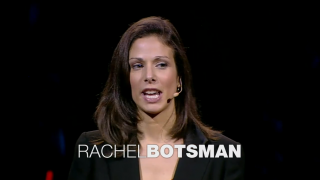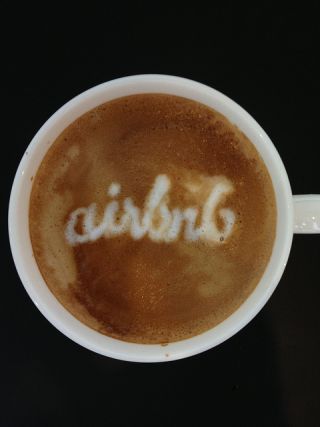Autism
Disability and the Sharing Economy
Will collaborative consumption enable or exclude those with social disabilities?
Posted August 11, 2014
I admit, I’ve developed a fascination with what some have called “collaborative consumption,” exemplified in sites like Airbnb, Uber, and Taskrabbit. Sites that bring buyers and sellers together in new and innovative ways. I see real possibilities in these technologies to make my life easier — but there are aspects of it that trouble me. I worry that the rise of collaborative consumption could, in some ways, lead to greater exclusion of those of us with social disabilities like autism.

In her 2012 Ted Talk on the subject, Rachel Botsman says collaborative consumption is “...about empowering people to make meaningful connections, connections that are enabling us to rediscover a humanness that we've lost somewhere along the way, by engaging in marketplaces like Airbnb, like Kickstarter, like Etsy, that are built on personal relationships versus empty transactions.” Sounds pretty good. Pretty inviting. So why would this give me pause?
Well, the fact of the matter is a lot of these sites have a deeply embedded social component. While the addition of technology can sometimes be a mitigating factor in the social challenges many of us on the autism spectrum face, it doesn’t remove those challenges altogether. So what happens when, as Ms. Botman envisions, one day our lives can be summed up on a social “reputation dashboard” showing what people think of us?
This frightens me, not because I, or others like me, are some sort of nefarious villains that need to hide from the light, but because we know all too well how easily social missteps can derail everyday interactions, and how that can cause others to form opinions of you that aren’t really accurate. When I think about all the social missteps I’ve made over the years, and imagine them preserved for posterity, well — it’s an unpleasant thought. Even more so when you imagine a reality in which that data will be used by others to determine whether to provide you services. What will the implication of that be?
On the other hand, many of these technologies have upsides that appeal to me greatly. I’ve long been an early adopter of technology, in areas when it can help. Simple everyday social tasks, like transferring money at the bank, can be made arduous for someone like me by the simple fact that it requires speaking to another human being. The option to do tasks like this via an automated phone line, or via a web site removes a major barrier for me, and a lot of stress from my day. Being able to handle typically stressful social aspects of a transaction online, such as ordering and payment is deeply appealing.

It is also hard to ignore the democratizing aspect of such sites in terms of access to capital. I was fascinated watching musician Amanda Palmer’s account of the success of her Kickstarter campaign, which was funded by her fans to the tune of $1.2 million. A favorite band of mine, Toad the Wet Sprocket, got their first studio album in 16 years funded in the same way. A number of recent autism projects, such as the Loud Hands Project and Mark Utter’s I Am In Here, have also been crowdfunded. And, apparently, according to Ms. Botsman’s blog, it’s just the beginning.
So, does this democratization carry over into other collaborative consumption sites? I’m not sure. I’ve not used a lot of the sites in question — I am curious to do so, but also fearful. As is typical for many of us on the spectrum, routine is protective for me. Variances from my social scripts can throw me in ways most people don’t realize, even in areas where it would seem I’ve learned to deal with a little more spontaneity.
For example, I do a bit of traveling. Although the scheduling of this travel is often erratic, I’ve managed to build enough routines that I can at least make it through the typical steps in a structured fashion, minimizing the stress on that score. I tend to stick with the same companies, and have learned their processes well.

One area I’ve been unhappy with is my taxi service. I don’t feel comfortable driving under certain circumstances, nor am I really comfortable parking in a crowded place like an airport, so if I’m traveling by air, a taxi is a necessity. After trying several of the taxi companies in the area, and not loving any of them, I settled on one. Thus far I have stuck with it, despite some pain points, such as cost, their airport pickup process, punctuality and communication.
As compares to other companies, their cost isn’t that out of line, but it’s still costly. Several of the pain points were improved a couple of years ago by the introduction of a mobile app. This app provided accommodation for my hearing and audio processing issues through an automated airport pickup process that provides you with text and web alerts as to the status of your order and ETA, and better communication in general. Unfortunately, not long after they introduced this app, it stopped working.
Those at the office showed no urgency to fix it, and the drivers, while sympathetic, all indicated that while they could give the home office my feedback, they really had no influence in the matter. So, not long ago, when I chanced upon an article about the legal battles faced by social ride-sharing services in various metropolitan areas, I was interested. Such a thing existed? To be able to save money on a reasonably priced ride, order completely via mobile, pay online, and have visibility to where the driver was in route seemed a perfect solution. Did such services exist in my area?
I searched online and took a look at several options, Uber, Lyft, and Sidecar. All looked pretty cool as far as their apps went, but I couldn’t get a full preview of the app or area availability prior to entering my payment information, which wasn’t ideal. I was also worried about safety...would it really be safe to get into some stranger’s car? I’ve had enough scary experiences with taxi drivers, moments when I found myself in the back of some strange car, going down some pitch black alley I’d never seen before, wondering if this was some kind of weird shortcut or something more sinister.
At least in those situations, the companies’ dispatcher knew where I was, if I should turn up missing. Could I expect the same or better from a small internet startup? All the sites I checked emphasized background checks and actually offered extra insurance in case of accident. Not bad. Maybe it was worth looking at, after all.
A couple things still bothered me, while looking at the sites. First and foremost of these was the emphasis on the social aspect of the transaction on several of the sites. Lyft, for example, calls itself your “friend with a car” and suggests that making a new friend goes along with requesting the ride. That may seem cool and wonderful to those for whom socializing is easy, but what about those, like me, who struggle with it? This social emphasis changes the expectations of the situation in ways that I can’t begin to count, and have no idea how I’d navigate.
True, it’s not as if typical taxi rides are not social interactions. I’ve had my share of interesting conversations in that context. A suspected spectrumite who gave me a guided tour of the company’s dispatch systems and technology. A fellow who introduced me to eastern european pop (that for some reason had track names in Japanese). A lebanese gentleman who lamented his experiences with love (“So I tell you, no more womens...I say, no more womens...”).
What’s different in the traditional model is that such conversations are explicitly defined as optional. One of my rights, as a customer (as defined by the company’s rules) is a silent ride. So, for the most part, if I say “please” and “thanks” and provide prompt payment, all is well. This is a godsend when I’m barely functioning during a 3 AM ride to the airport, or dragging home after a massively overloading trip through the sensory chaos of multiple airports.
So I find myself wondering, what can I expect from this new model? How are the expectations altered, and how will it affect me if I get it wrong, especially since I will be rated accordingly? Will the driver think me rude if I can’t manage a suitable social conversation? What garners a good rating? Is it based on anything concrete, or is access to this service simply reduced to a popularity contest?

These things worry me about many such services. As much as they can democratize, they can also serve to enable, or at least reflect, the biases of society at large. An example of this was given in a racial context by a recent Harvard study which looked at room rental prices on Airbnb. Controlling for factors such as location and amenities, their data showed that African American hosts get 12% less for their rentals than comparable accommodations rented by someone who isn’t African American. Is it possible a similar effect on could happen on some sites with regard to customers or service providers with disabilities, especially if those disabilities affect how someone socializes? I wonder.
Overall, what will the rise of collaborative consumption mean? My guess will be that just like social media sites that came before, the effect will be mixed. They are tools used used by people and will reflect who those people are, and what they believe. In the end, what I wonder is -- if social sites reflect back to us who and what we are, what will such sites reveal to us about our approach to disabilities such as autism? Are our attitudes as inclusive as we like to think?
I sure hope so, but only time will tell.
For updates you can follow me on Facebook or Twitter. Feedback? E-mail me.
My book, Living Independently on the Autism Spectrum, is currently available at most major retailers, including Books-A-Million, Chapters/Indigo (Canada), Barnes and Noble, and Amazon.
To read what others have to say about the book, visit my web site: www.lynnesoraya.com.
RELATED RESOURCES
Rachel Botsman at TEDGlobal 2012 — The Currency of the New Economy is Trust
"I envision a realtime stream of who has trusted you, when, where and why, your reliability on TaskRabbit, your cleanliness as a guest on Airbnb, the knowledge that you display on Quora or [unclear], they'll all live together in one place, and this will live in some kind of reputation dashboard that will paint a picture of your reputation capital.
Now this is a concept that I'm currently researching and writing my next book on, and currently define as the worth of your reputation, your intentions, capabilities and values across communities and marketplaces."
Rachel Botsman at TEDxSidney 2010—The Case for Collaborative Consumption
"So today I'm going to talk to you about the rise of collaborative consumption. I'm going to explain what it is and try and convince you -- in just 15 minutes -- that this isn't a flimsy idea, or a short-term trend,but a powerful cultural and economic force reinventing not just what we consume, but how we consume."
Amanda Palmer at TED 2013—The Art of Asking
"So I fought my way off my label and for my next project with my new band, the Grand Theft Orchestra, I turned to crowdfunding, and I fell into those thousands of connections that I'd made, and I asked my crowd to catch me. And the goal was 100,000 dollars. My fans backed me at nearly 1.2 million, which was the biggest music crowdfunding project to date."
The Guardian — The Rise of Collaborative Consumption and the Experience Economy
Since the middle of the twentieth century, economic prosperity has been equated with a consumerist society with ownership at its core.
But in today’s hyper-connected world, this view of the world is beginning to change. The abundance of assets along with the relative affordability of almost anything, high-tech consumer platforms, the digitisation of products, close-knit social media communities and the economic downturn of 2008 have all meant that collaborative consumption is flourishing.
FastCompany — The Sharing Economy
The challenge that worries everyone in the sharing world, of course, is trust. It's one thing to believe that a knitter on Etsy will mail you that crocheted beret. It's another to let a stranger sleep in your home or borrow your second-most-expensive asset, your car...Most sharing platforms try to combat this issue by building a self-policing community. Almost all (including AirBnB) require profiles for both parties and feature a community ratings system.
Harvard Business School — Digital Discrimination: The Case of Airbnb.com
Online marketplaces often contain information not only about products, but also about the people selling the products. In an effort to facilitate trust, many platforms encourage sellers to provide personal profiles and even to post pictures of themselves. However, these features may also facilitate discrimination based on sellers’ race, gender, age, or other aspects of appearance.




